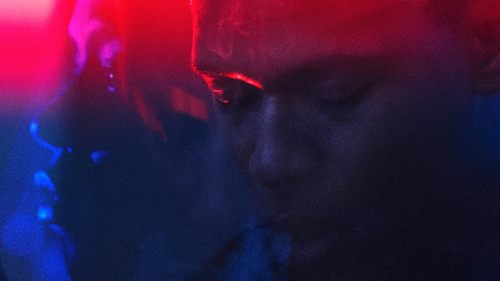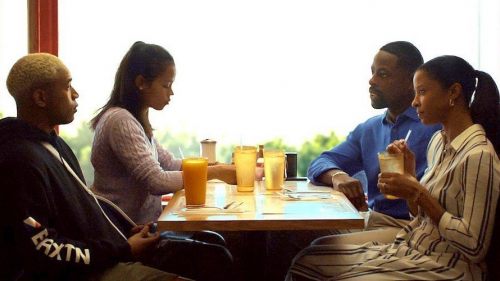WAVES Review: A Dizzying Portrait Of A Family In Crisis
The camera revolves wildly around a young couple in the front seats of an SUV tearing down a sun-bleached highway. They’re shouting along to a rapper on the radio. They’re happy and in love; goofy, irrational, love; the kind of love that leads to impulsive decisions and screaming matches and staying up on the phone until dawn. There’s an entire universe ahead on the other end of that highway, somewhere beyond their limited perspective – beyond the youthful microcosm of Now. The music is an aural assault as the camera ceaselessly revolves around the couple like a planet helplessly stuck in their orbit. This is our entry into the world of Waves, the visceral new drama from Trey Edward Shults, the writer-director of It Comes at Night. As with his previous film, Waves deals in loss, grief, and hope, but it’s a far more intimate and thrilling examination that eschews the genre metaphor in favor of something exceedingly human.
Waves is divided into two distinct halves: before and after; heartbreak and redemption; tragedy and beauty. The first half follows Tyler (Kelvin Harrison Jr.), a high school senior on the wrestling team grappling with an injury that threatens to destroy his future. Tyler suffers privately, terrified of angering his demanding father, Ronald (Sterling K. Brown), who was also a promising wrestler until an injury forced him out of the sport. Ronald is the dominant presence in Tyler’s life, his father’s potent masculine will molding every choice he makes. What Tyler fails to see – what we see with painful clarity – is that it’s not an injury that threatens to upend his future. To suggest as much is an oversimplification as egregious as blaming Tyler and Tyler alone for the decisions he makes on the path to implosion. While the destination is unknown, the path is marred with suffocating dread, heightened by Drew Daniels’ vertiginous cinematography. Similar to Josh and Benny Safdie’s anxiety-inducing approach in Good Time and Uncut Gems, Shults creates a claustrophobic atmosphere in which horror is imminent and avoidable to everyone but his protagonist. It is the purest distillation of ordinary tragedy, a perfectly horrible confluence of circumstances – including but not limited to internalized toxic masculinity and the pressures of subverting racial and social stereotypes that are themselves racially-charged.
Were this is a story of a privileged white male athlete fucking up his future despite his access and privilege, Waves might be a very different film. Shults is himself a white man, after all, and this is a deeply personal story about a suburban black family. Despite collaborating with Harrison Jr. (who also starred in It Comes at Night) on the story, Shults is the only credited screenwriter. It would be absurd to suggest that Tyler’s skin color has no bearing on the tone and texture of the film and its themes, and yet it feels somewhat fetishistic from a white point-of-view (such as mine) to express the opinion that Tyler’s race elevates the narrative and contributes to a more empathetic viewing experience. To put it simply: If Waves was about a white boy, it would be tedious and deeply uninteresting, particularly in a time when the fuck-ups and flaws of white men continue to dominate every facet of media.
Serving as the connective tissue between the two halves of Shults’ film is both Tyler’s family – his sister, Emily, specifically – and a propulsive score composed by Trent Reznor and Atticus Ross. The score works in concert with the soundrack to sustain the immersive quality of the first half of the film, the focus of which is largely on Tyler and his girlfriend, Alexis, played by Alexa Demie of Euphoria fame. Demie delivers a stunning, vulnerable performance that rivals Harrison Jr. every step of the way (her casting, along with the stylistic choices of the film’s first half will inevitably elicit comparisons to Demie’s HBO series). Brown and Harrison Jr. are electric, and the latter treads thematic territory fascinatingly similar to his performance in Luce (a film with intriguing ideas but tepid execution), but Demie, Taylor Russell (who plays Tyler's sister), and Renée Elise Goldsberry (his mother), are all equally phenomenal – each performance so viscerally imperative that the removal of one might topple the whole thing.
Waves sort of downshifts into the second half, its tone and energy mutating into a more somber portrait of a family in crisis. Emily becomes the protagonist: a bright teenager whose potential is overshadowed by Tyler, and whose life sadly continues to exist in those shadows in the wake of the tragic moment that rattles her family. But Shults finds light in the dark through Emily and her journey toward acceptance – both of herself and her family’s newly fractured life. That journey becomes literal when she joins a schoolmate and love interest (Lucas Hedges) on a road trip to visit his estranged, ailing father. If Tyler shatters the family, it’s Emily who begins picking up the pieces and putting them back together. There’s such a contemplative and graceful quality to this portion of the film, though the initial shift is inherently jarring given the bold nature of the preceding half.
The crucial piece of Waves’ conclusion is reconciliation, both literal and figurative. It’s those actual moments – so quiet and small – of acceptance and forgiveness; it’s the idea of reconciliation as a salve that soothes the raw divide between the two halves of the film, and the two young lives lacerated and forever scarred by simple tragedy. In the film's final moments, Shults finds an optimism every bit as ordinary as the personal horror that preceded it. If Tyler is the devastating undertow of Waves, Emily is its exhilarating crest.



